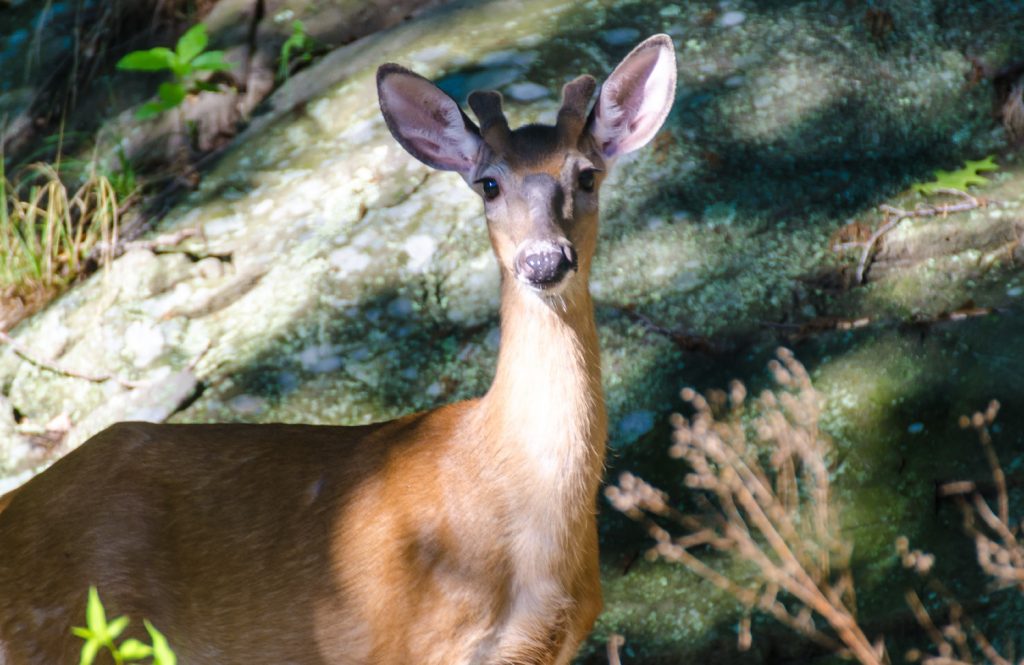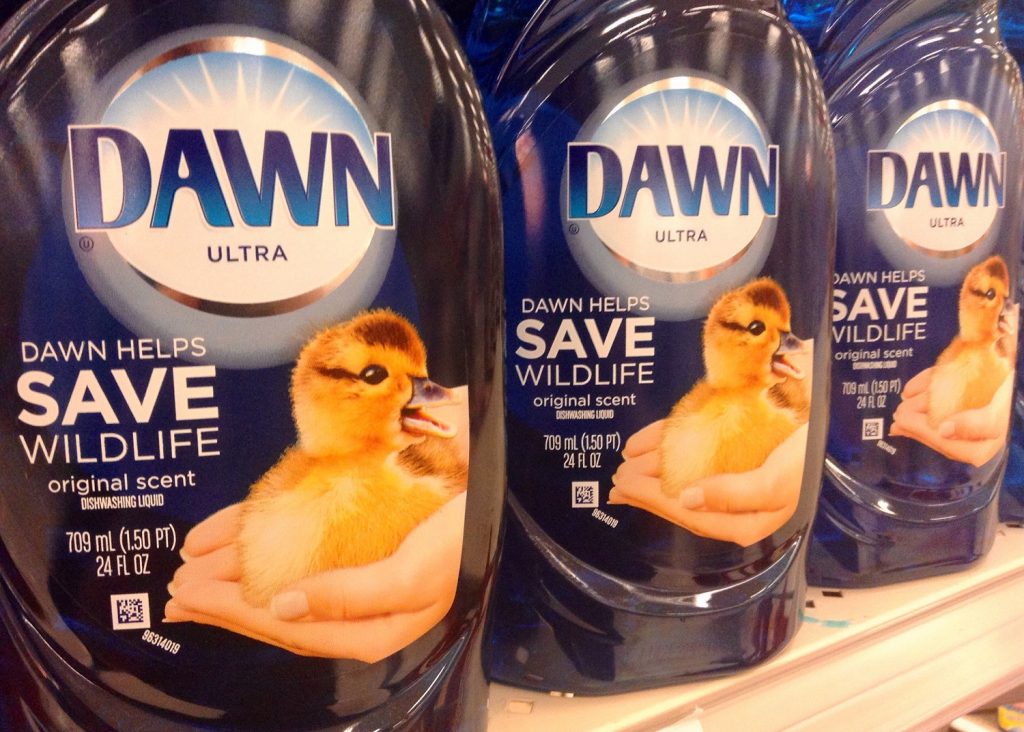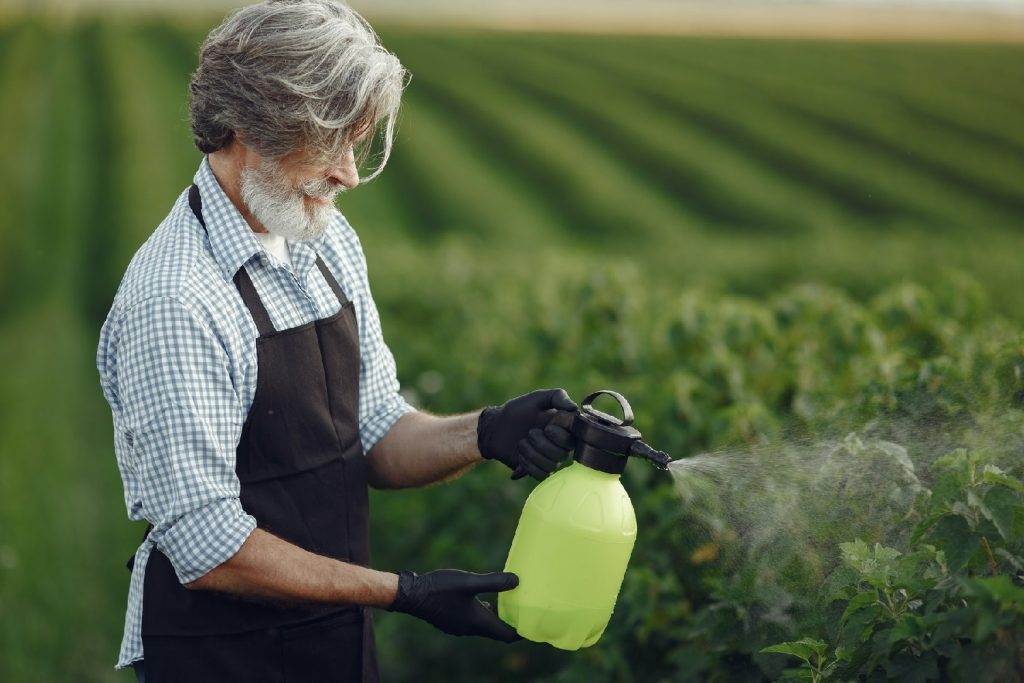

We’re here to help! Wild Yards is a completely free website that is 100% dedicated to helping you create a wildlife-friendly, sustainable yard. Read more
WildYards is reader-supported. When you buy a product through a link on our site, we may earn a comission. Every product is independently selected by our (obsessive) editors and our reviews are unbiased and objective. Read more about our mission or our privacy policy.
Beautiful as they are, deer can destroy your garden in a very short period of time. They can ruin a vegetable patch in a matter of hours and chew their way through thousands of dollars of landscaping overnight. Offering your local deer an alternative food source by tossing out some soybeans or planting a patch of their favorite grasses can help. Unfortunately, some deer aren’t so easily distracted. But homemade Dawn dish soap deer repellent can help.
Dawn dish soap deer repellent is easy to make. Its neutral pH makes it safe to spray on any plant, from fruit trees and vegetables to flowers and ornamental shrubbery. Even though Dawn dish soap tastes terrible, it will not harm the deer if they taste it, it will only repel them, keeping both the local wildlife and your expensive landscaping safe.
Is Dawn safe for deer to ingest?
Nothing is more frustrating than walking through your backyard only to find that all of your plants’ new growth has been eaten down by deer. If installing wildlife-proof fencing or purchasing deer-repelling sprinklers is out of your budget at the moment, don’t despair. You can still repel the deer without breaking the bank.
Dawn dish soap is mild and gentle compared to other soaps, yet it’s a potent anti-greaser, designed to break up stuck-on food particles. It contains phosphates, phthalates, and triclosan, powerful surfactants that make it lather as a good soap should. But because it’s a soap, it tastes, well, soapy. And because it also has a neutral pH, it has an alkalinizing effect on the mouth, similar to baking soda, making it incredibly unappetizing.
Dawn is toxic when ingested in huge quantities. But spraying a bit of diluted Dawn dish soap onto your plants will allow the deer to get a small taste of it — enough to encourage them to stay away from your garden without harming their health.

What are the benefits of using Dawn dish soap as a deer repellent?
Using Dawn dish soap to make your own deer repellent is fantastic if you’re pressed for time and you need to do something to get the deer off your plants fast. Dawn dish soap is a common household item. Because most of us have easy access to it, we can whip up our own homemade deer repellent in a jiffy without having to make a special trip to the store.
Dawn is also relatively cheap, so homemade Dawn dish soap deer repellent is much less expensive than store-bought deer repellents. And because the recipe for this deer repellent is so simple, you can alter it by adding different ingredients to make it even more unpalatable (more on that in a minute!).
Because it’s a soap, Dawn is sticky. You have to lather and rinse to get it off. If the soap is diluted, once the mixture dries, it takes a lot of moisture to be removed. So unless it rains or your sprinklers get your plants wet, it will stay on the foliage keeping them coated in a foul-tasting substance that your neighborhood deer will find repulsive.
Are there any downsides to using Dawn dish soap as a deer repellent?
Using Dawn dish soap as an ingredient in a homemade deer repellent does come with a few downsides. To start, it is toxic when ingested in high quantities. Just a taste won’t hurt you or the wildlife. But you certainly wouldn’t want to drink it or leave large soapy water buckets out that animals could drink out of.
The second downside to Dawn is that it contains surfactants that break down grease, and that includes the waxy substances that coat foliage and work to hold in moisture. If improperly diluted or over-applied, Dawn can cause plants to become dehydrated, and this could ultimately lead to their death.
There are many advantages to using Dawn as a deer repellent, but it has its disadvantages, too. So keep these things in mind when using Dawn to help keep the deer off of your plants.

How can you make Dawn dish soap deer repellent for your plants?
Want to make your own Dawn dish soap deer repellent? There’s nothing to it! Just pour 4 cups of water into a spray bottle, add 2 tablespoons of Dawn dish soap (the original blue formula works best), and shake it well. Once it’s mixed together, simply spray it onto the plants your local deer like to nibble on most.
Deer can be tough to predict. Most mature deer will take one bite of your sprayed plants and look for greener pastures to graze on. But young deer may be harder to deter, as they will nibble on anything and may still tear up plants that taste bad, even if they don’t eat them. If, for whatever reason, your homemade Dawn dish soap deer repellent isn’t doing the job, consider adding a few extra ingredients to the mix to make it more powerful.
Raw egg
Deer are acutely sensitive to texture. They don’t like to eat leaves that are leathery or bristly, or that are covered in a slimy coating. Raw eggs are very slimy and on top of that they’re full of sulfur, so they taste bad, too. Especially rotten eggs.
Try whisking a raw egg or two to add to your diluted Dawn dish soap deer repellent. Just be sure to strain the raw eggs through a sieve to make sure there are no gelatinous globs that could clog the nozzle of your spray bottle. Combined with Dawn dish soap, raw eggs coat leaves in an unappetizing film that deer will steer clear of once they get a taste.
Garlic or onion juice
Garlic, onion, and other members of the Allium family are also full of sulfur. It’s what makes them produce such a pungent odor. Deer are naturally repelled by strong tastes, especially when they’re bitter. So adding some garlic or onion juice to your Dawn dish soap deer repellent can make it even more disgusting to the deer.
To make garlic or onion juice, peel the garlic and/or onions, add them to a blender with a few tablespoons of water, then puree them well. Once they’re done, strain out the pulp, and store the onion/garlic juice in a glass jar in the fridge. Add a few tablespoons to your homemade deer repellent and shake it well before spraying it on your plants.
Elmer’s glue
Elmer’s glue is non-toxic. It’s also (surprise, surprise) sticky! Mixing a tablespoon of Elmer’s glue into your homemade deer repellent helps the mixture stick to the foliage of your plants. And the better your deer repellent sticks to your plants, the less often you have to reapply it.
Elmer’s glue leaves a thin coating on the surface of your plants, so you need to be careful to only spray it onto the leaves and stems. When applied to flowers and flower buds, this coating may seal in pollen and leave a nasty taste that beneficial insects like bees, hoverflies, and butterflies find repulsive.
Hot sauce
Deer like to eat tender, juicy, sweet-tasting foliage. They’re not big fans of spicy food. So when mixed with Dawn dish soap, hot sauce can be incredibly effective at repelling hungry deer. Simply add 1 to 3 teaspoons of the hot sauce of your choice to your homemade deer repellent, mix well, and apply to your plant’s foliage careful not to get any on your skin or in your eyes.
The only downside to using hot sauce on your plants is that capsaicin, the compound that makes pepper spicy, can harm insects. If your plants are infested with caterpillars, beetles, or aphids, this may not be a problem. But, unfortunately, capsaicin also kills good bugs, like bees. So refrain from applying hot sauce to bee-favorite plants, like sunflowers, salvias, and petunias.

Essential oils
Deer naturally avoid herbs like lavender because their foliage is loaded with highly concentrated essential oils. These compounds are fragrant and bitter-tasting, so they’re well-suited to repelling deer, as well as rabbits and insects.
If you want to take things up a notch, try adding 10 to 20 drops of essential oil to your Dawn dish soap deer repellent. Choose lavender, citronella, rosemary, peppermint, eucalyptus, or clove essential oils. Any combination of these essential oils will help keep the deer away from your garden.
Mineral oil or vegetable oil
Remember, one of the downsides to using Dawn dish soap is that it can break down the waxy coating on foliage, making it easier for plants to lose water. One way to counteract this effect is by adding ¼ cup of mineral or vegetable oil to your homemade deer repellent to recoat the plant’s leaves to help them hold onto moisture.
Deer dislike the way oils coat their tongues. Because they’re so slippery, deer aren’t likely to nibble on foliage that’s been sprayed with oil for long. So add some to your deer repellent before you spray it onto your plants, and don’t forget to shake the mixture well before applying it.
Vinegar
When combined with Dawn dish soap, vinegar creates a double whammy that’s sure to send your neighborhood deer running. Vinegar smells as strong as it tastes, and deer don’t care for it at all. So add ¼ of a cup of apple cider or white vinegar to your diluted Dawn dish soap mixture before spraying it on your plants.
Vinegar is acidic, so it’s pretty drying. Because Dawn can break up the waxy coating on your plants’ foliage, and vinegar can increase the rate of moisture loss, we highly recommend adding mineral or vegetable oil to your deer repellent, too, to mitigate these effects.
Mayonnaise
Mayonnaise contains many of the things deer hate: eggs, vinegar, and a blend of spices. Adding a few tablespoons of mayonnaise to your deer repellent not only makes the mixture stick to foliage better but also makes the spray taste worse for the deer.
If you want to use vinegar or eggs as separate ingredients, you can still add mayonnaise to your homemade deer repellent, too. And, if you don’t have any mayonnaise on hand, yogurt, sour cream, or even milk can be used, instead.
How else can you keep deer out of your yard?
In addition to using Dawn dish soap deer repellent, there are a few other cost-effective things that you can do to keep the deer away. Start by making your yard as noisy and unpredictable as possible. Hang wind chimes near your ornamental plants and set up whirligigs to deter deer.
If you have a dog, let your dog out during the early morning and evening hours, when deer are most likely to be browsing through your yard. Emptying your hair brush and your pet’s brush outside will also repel the deer, who dislike animal and human hair because they avoid hanging out where predators like to stay. These simple steps, combined with a homemade Dawn dish soap deer repellent, will prevent hungry deer from eating your plants
Also, consider growing plants that deer don’t like to eat. Marigolds, in particular, are great for repelling deer, as well as rabbits and insects. Dianthus, elephant ears, and dahlias are also (mostly) deer-resistant, so try to include these plants in your landscaping to keep your neighborhood herd of deer as disinterested as possible.
Is Dawn dish soap deer repellent worth the trouble?
Homemade deer repellents are easy enough to make, plus they’re a great way to cut costs, but they do take a little bit of time and planning. This begs the question, is it worth all the trouble to make Dawn dish soap deer repellent?
Because this homemade deer repellent is cost-effective, and because Dawn dish soap is so effective at keeping deer at bay — especially when combined with other deer-repelling ingredients — this makes Dawn dish soap deer repellent well worth the trouble. So take a moment to whip some up. The plants in your wild yard will be glad you did!
